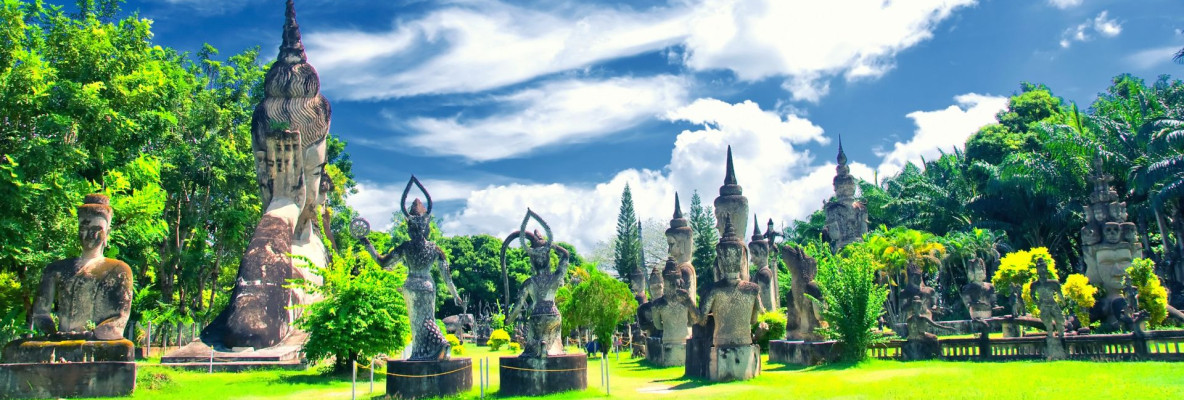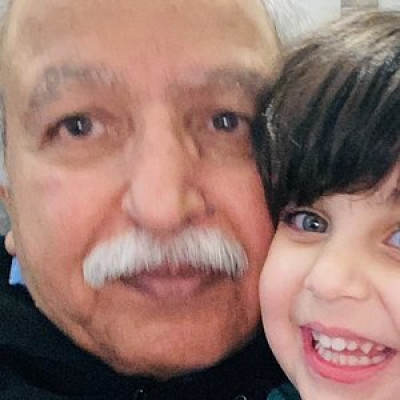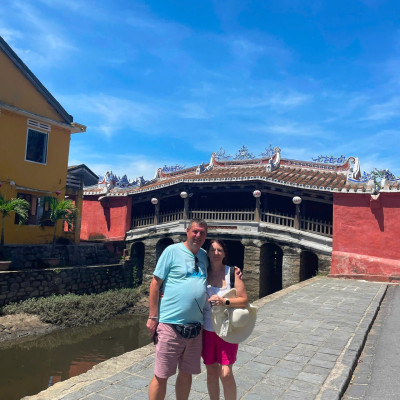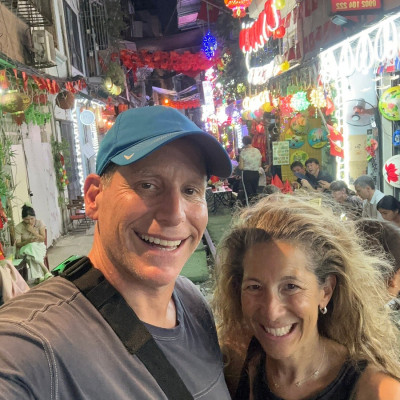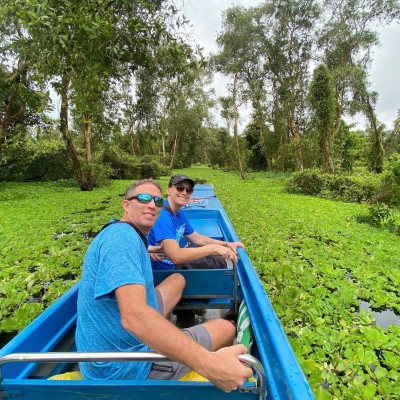6 days - 6 DAYS CLASSIC LAOS
Itinerary
DAY 1. VIENTIANE - ARRIVAL -
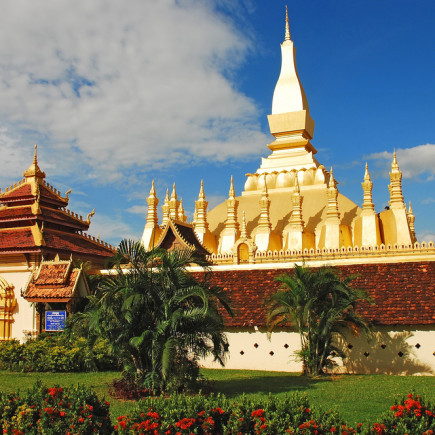
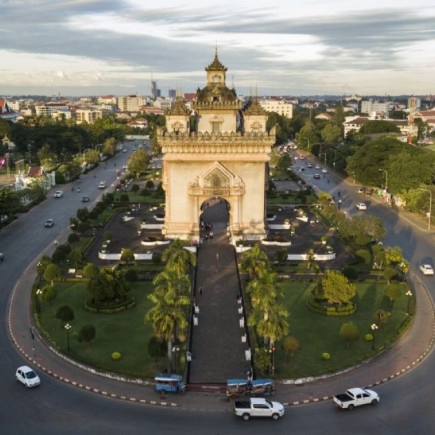
Upon arrival in Vientiane, transfer from Wattay International Airport to the hotel. The rest of the day will be left free to relax after your flights. Depending on your arrival time, there is still a chance to explore the city and walk along the Mekong River and visit the Night Market.
Overnight in Vientiane
What's Included
DAY 2. VIENTIANE - CITY TOUR B, L
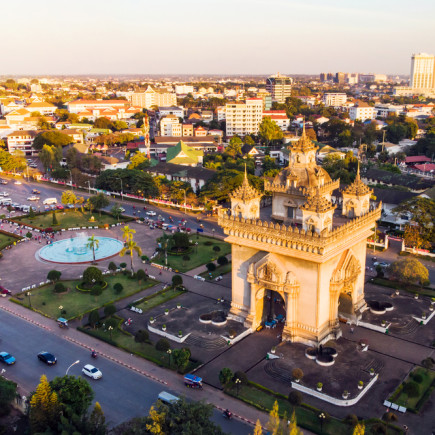
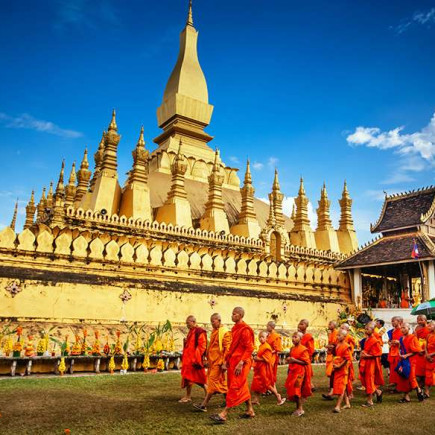
Discover the charms of Vientiane, a quiet but endearing capital city. Tour includes Wat Sisaket, Hor Phra Keo, That Luang Stupa and Patuxay Monument. Visit to markets, where you can find an abundance of locally made handicrafts.
WAT SISAKET
Wat Si Saket is an early 19th century Buddhist monastery in the center of Vientiane. It is the oldest temple of the town that is still in its original form. The temple was built in 1820 near the Royal Palace in the center of town by King Anouvong, the last King of Vientiane. It is one of the very few temples that survived the destruction that came with the Siamese armies that looted and burnt the city in 1827. The temple was restored in the 1930’s. Next to the cloister is the more recent, active part of the temple with resident monks. Right across the street is another one of Vientiane’s most important temples, the Hor Phra Keo.
HOR PHRA KEO
Hor Phra Keo is one of Laos’ most highly venerated temples, now turned into a museum. The temple derives its name from the Emerald Buddha, Thailand’s most highly revered Buddha image which was enshrined in the temple for over 200 yearsTHAT LUANG STUPA
That Luang Stupa or “Great Stupa” is the most important Buddhist monument in Laos. The large golden stupa in Vientiane is believed to enshrine a breast bone of the Buddha. The pagoda also known as That Luang is officially named Pha Chedi Lokajulamani, which translates to “World Precious Sacred Stupa”.
PATUXAY MONUMENT
Vientiane' s Arc de Triomphe replica is a monumental sight. Officially called 'Victory Gate' and commemorating the Lao who died in pre-revolutionary wars, it was built in the 1960s with cement donated by the USA intended for the construction of a new airport. Climb to the top for panoramic views over Vientiane.
Overnight in Vientiane
What's Included
DAY 3. VIENTIANE - BUDDHA PARK - VANG VIENG B, L
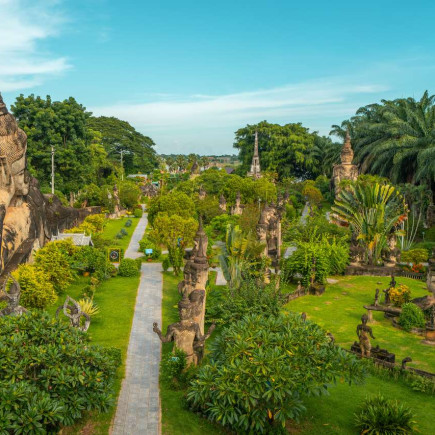
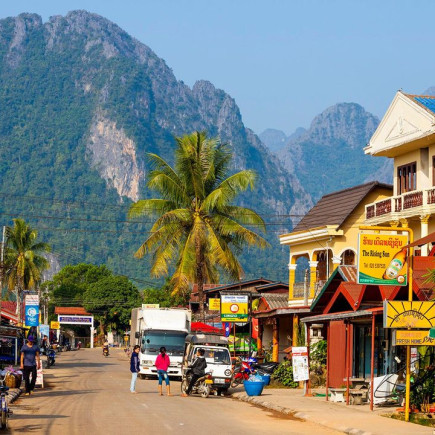
Buddha Park (aka Wat Xieng Khuan) is a famous sculpture park with more than 200 religious statues including a huge 40-meter high reclining Buddha image.
The best spot for photography here is on top of the giant pumpkin structure standing about three stories high. The entrance is crafted to look like a demon’s mouth (about three meters high) with a stone ladder inside leading to a bird's eye view of the entire Xieng Khuan Park.
It was built in 1958 by Luang Pu Bunleua Sulilat, a monk who studied both Buddhism and Hinduism. This explains why his park is full not only of Buddha images but also of Hindu gods as well as demons and animals from both beliefs.
The most outstanding ones include Indra, the king of Hindu gods riding the three-headed elephant (aka Erawan and Airavata), a four-armed deity sitting on a horse and an artistic deity with 12 faces and many hands, each holding interesting objects. They are all equally impressive not only because of their enormous size but because they are full of interesting details and interesting motifs.
There is a local eatery and café offering food and drinks to tourists at one end of the park right next to the Mekong River that makes a great spot to chill after all the walking and climbing. Among the popular snacks are papaya salad, fried bananas and cold Lao beer.
Drive north to Vang Vieng, which is tucked in amongst giant limestone cliffs and sits along the Nam Song River. This is an area of immense natural beauty, with the Nam Song River passing through the shadows of the dramatic mountains.
VANG VIENG
The small town of Vang Vieng is located 150 km north of Vientiane. This is a place of a dreamlike landscape of bizarre limestone mountain peaks and scenic cliffs with the Nam Song River bisecting the town. At the base of the town’s limestone mountains are a network of caves.
Overnight in Vang Vieng
(Distance: 160 km / 3-4 hrs)
What's Included
DAY 4. VANG VIENG - LUANG PRABANG B, L
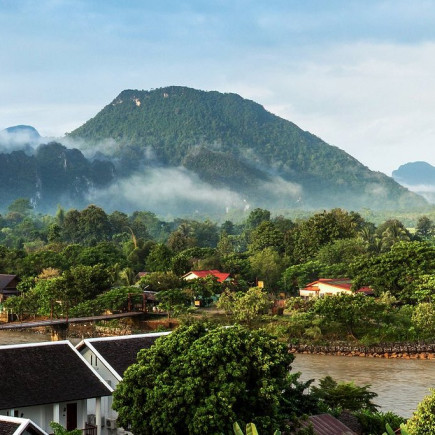
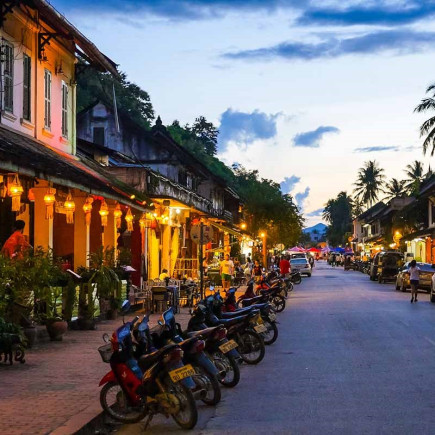
We leave Vang Vieng north on Road 13, which leads across the highlands through the stunning countryside to Luang Prabang Province.
Enjoy scenic views and visit one of the many Hmong villages in the region. The Hmong are an ethnic group from the mountainous regions of Laos. They are also one of the sub-groups of the Miao ethnicity in Southern China. Hmong groups began a gradual southward migration in the 18th century due to political unrest and a lack of arable land.
LUANG PRABANG
Luang Prabang, a UNESCO World Heritage site. This beautiful city was the royal capital and seat of government for the Kingdom of Laos until the revolution of 1975. The main part of the city consists of four main roads crisscrossing a peninsula between the Nam Khan and Mekong Rivers.
Overnight in Luang Prabang
(Distance: 220 km / 5-6 hrs)
What's Included
DAY 5. LUANG PRABANG - CITY TOUR B, L
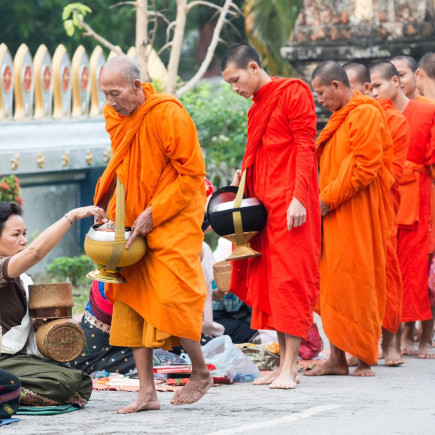
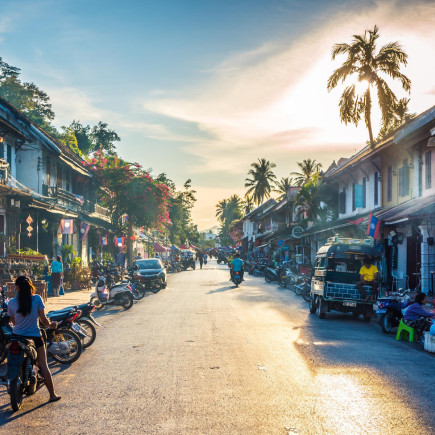
Explore the city by Tuk Tuk. The Tuk Tuk (a motorized-rickshaw) was brought to Southeast Asia in 1934 from Japan, and has since then become an icon of the region. The classic Tuk Tuk is a sheet-metal roof covering an open frame which rests on three wheels. They’re one of the most popular forms of transportation in Laos, Thailand and Cambodia, and this Southeast Asian emblem is the perfect vehicle for an open-air tour of Luang Prabang.
Depart from the hotel at 08:30, get on the Tuk Tuk to the open-air Morning Market in the old town. There are only a few large grocery stores here—instead, food is still produced by small farming families and villages and brought to Luang Prabang from the surrounding rural areas. The guide will explain the common vegetables and fruits that are in season and pick up some snacks for later.
A short walk from the market is Wat Mai Suwannaphumaham (“New Monastery”), the National Museum (Royal Palace) and Hor Phra Bang. After the museum, travel again by tuk tuk through more of the picturesque town to Wat Visounnalath.
Another short tuk tuk ride along the Nam Khan River to Wat Xieng Thong. End the day’s tour on top of Mount Phousi.
MORNING MARKET
This small market is the Laotian "supermarket" where they come to buy their fresh fruit, vegetables and meat, which are offered in showcases which are not always the way we used to see in most of our countries. Some products are coming from the jungle around, and will be for sure highly exotic for travelers from western countries.
WAT MAI SUWANNAPHUMAHAM
The impressive Wat Mai Suwannaphumaham is one of Luang Prabang’s largest and most richly decorated temples. Both its interior and exterior are extensively adorned with black and red lacquer decoration and gold leaf. The temple, also known as Wat Mai, meaning “new temple” was founded around 1780 by King Anurat of Luang Prabang Kingdom.
NATIONAL MUSEUM (ROYAL PALACE) AND HOR PHRA BANG
Set in a spacious, well-tended garden just off one of Luang Prabang’s main boulevards (Sisavangvong Road), you will find the fascinating Royal Palace Museum, which is also known as Hor Kham. The museum is well worth a couple of hours of your time if you want to learn more about Lao history and culture. Originally the residence of the king, the museum was designed in the French Beaux-Arts style, with many tasteful accents of traditional Lao culture. When the communists came to power in 1975, they took over the palace and sent the royal family to re-education camps. The palace was converted into a museum that was opened to the public in 1995 after careful renovation, and remains in good condition. The grounds contain a number of other buildings including a new exhibition hall and a chapel (Hor Phra Bang), and a statue of King Sisavangvong.
WAT VISOUNNALATH
Founded in 1512 during the reign of King Visounnalath (1501-1520), this temple was a symbol of the Kingdom’s unity. The carved wooden railings in the temple’s windows are reminiscent of the Wat Phou temple in Champasak, in the far South of Laos. Inside you can admire ancient statues and steeles. Also located on the grounds of this temple is the That Pathoume, also known as That Mak Mo (the watermelon stupa) because of its shape.
WAT XIENG THONG
Founded at the tip of the Luang Prabang peninsula is one of Laos most beautiful and richly decorated temples. This temple is a Royal temple built by King Setthathirath in 1559 on the banks of the Mekong river. It is one of the few temples that was not destroyed during the Black Flag Army invasion of 1887.
MOUNT PHOUSI
Rising 150 m above the center of town, Mount Phousi cuts a distinctive figure on the Luang Prabang skyline. The hill is popular as a place to watch the sun rise or set over the Mekong River. From the summit, enjoy a spectacular 360 degree outlook across the city and its many temples, and out over the surrounding landscape to the mountains in the distance. For a complete experience, go up Mount Phousi on one side and use the other set of steps to make your way down again.
The tour will end with a tuk tuk trip back to the hotel.
Overnight in Luang Prabang
What's Included
DAY 6. LUANG PRABANG - KUANG SI WATERFALL - DEPARTURE B, L
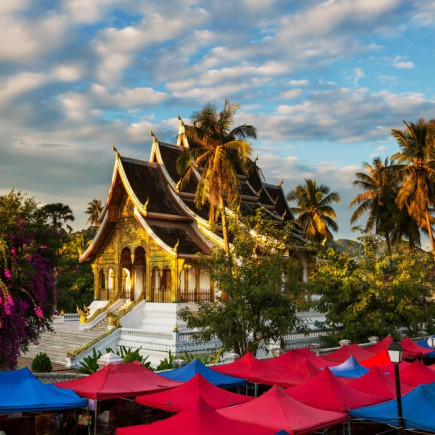
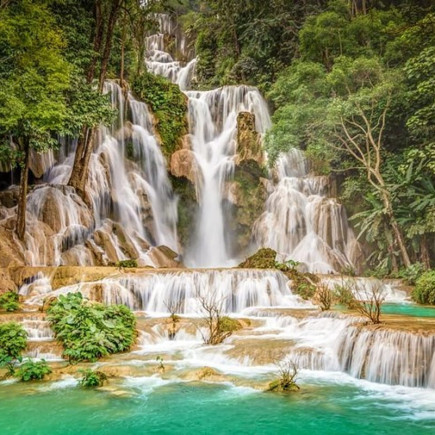
fter breakfast at the hotel, visit the local Phosy Market. Then travel by vehicle to the beautiful Tad Kuang Si Waterfalls, stopping on the way to visit Hmong and Khamu villages. Hmong and Khamu villages have different structures and ways of life; here, we can learn about their traditions and the differences between Lao, Khamu and Hmong culture.
PHOSY MARKET
Phosy Market is by far the biggest market in Luang Prabang. There are several hundred merchants of all kinds proposing a large variety of products.
KUANG SI WATERFALL AND BEAR RESCUE CENTER
Kuang Si Waterfall is the biggest waterfall in the Luang Prabang area with three tiers leading to a 50-meter drop into spectacular azure pools before flowing downstream. The pools also make great swimming holes and are very popular with both tourists and locals. Visit the Bear Rescue Center within the Kuang Si Waterfall Park (No extra entrance ticket).
Transfer to the hotel and/or the airport for departure
What's Included
Tour inclusions
- Accommodation with daily breakfast
- Private Transfers with AC
- English speaking tour guides
- All entrance fees as listed
- Meals as specified in the itinerary
- All adventurous activities as specified in the itinerary
- Bank transfer (if any)
- A Bottled water/day
- Airport Pick-up and Drop-off
Tour exclusions
- Early check-in or late check-out
- International flight tickets
- Meals not mentioned in the tour itinerary
- Other beverages during the tour
- Visa fees - as per country requirements
- Tips for Guides & Drivers
- Travel insurance
- Optional excursions and activities
- Personal expenses
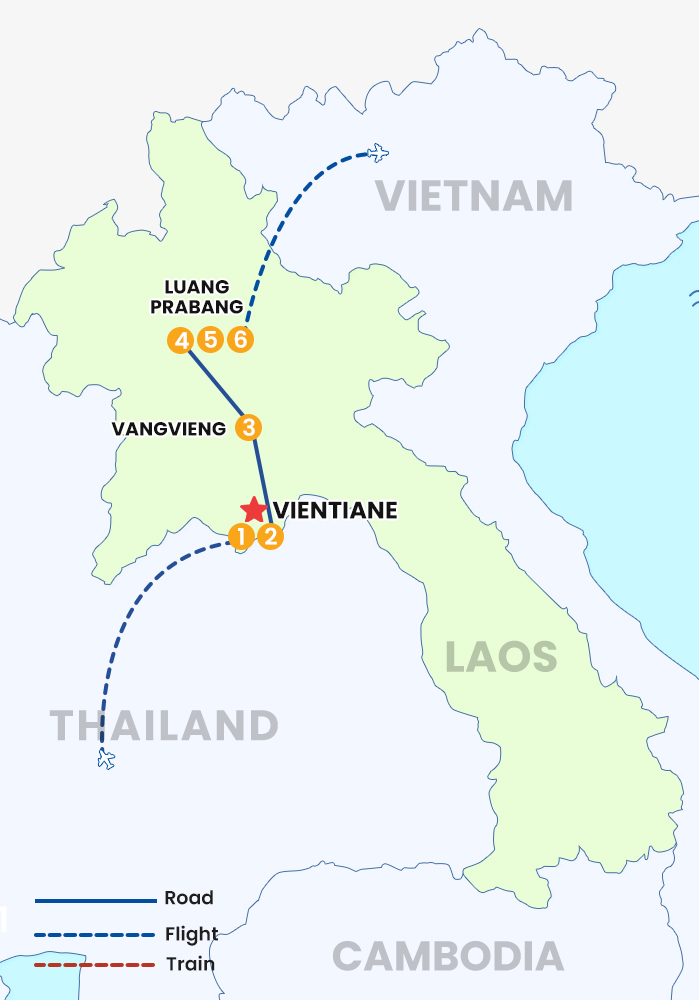
- Starting Point: Vientiane, Laos
- Ending Point: Luang Prabang, Laos
- Tour Type: Private tour
- Language: Operated in English
- Inclusions: Airport pick-up & drop-off, accommodation, professional guide, listed meals, entrance tickets, transportation, taxes, booking fees
Speak to Your Local Travel Expert





